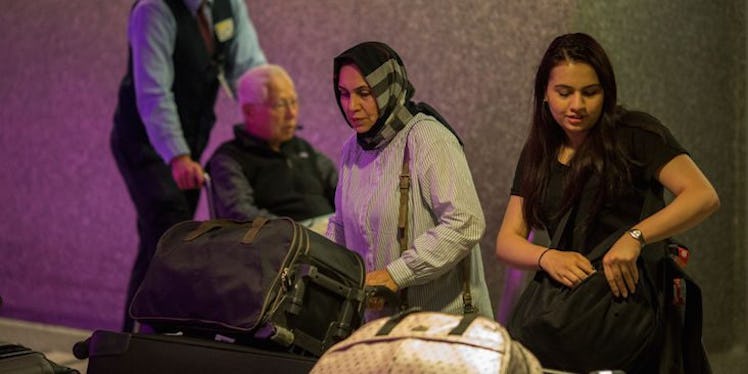
Trump's New Travel Ban Will Include Restrictions On Citizens In 3 More Countries
On Sunday, Sept. 25, the existing ban that restricted travel from six Muslim-majority countries expired and a new set of rules kicked it. President Donald Trump's new travel ban will severely inhibit, or place additional scrutiny on, those traveling from a total of nine countries. The new rules added three more countries to the list of those affected.
Trump's effort to ban people of certain countries from entering the U.S. has been a months-long crusade with numerous bumps along the way. His first executive order, signed in January after he took office, banned entry by citizens of seven countries: Somalia, Iraq, Iran, Libya, Sudan, Syria, and Yemen. Colloquially referred to by some as the "Muslim ban," this order was struck down by multiple courts.
In March, Trump released Executive Order 13780, the latest attempt to ban travelers. This version restricted the previous six countries, minus Iraq, but faced legal scrutiny as well. The order was temporarily allowed to take effect for 90 days starting in June while the Supreme Court was weighing its merits.
In total, according to the official White House release, nine countries will see at least some affect thanks to the new ban.
With the new rules, citizens of Chad, Somalia, Syria, Libya, Iran, and North Korea will face the harshest restrictions. Additionally, some specific groups in Venezuela and Iraq will be subject to increase scrutiny or security measures.
Headlines across news outlets give a confusing picture of how many countries are actually affected; The New York Times lists seven countries in total while the Washington Post and The Hill count eight.
Per the White House document, eight countries are listed together as subject to the ban, with Iraq mentioned separately as facing "great screening security," but no entry restrictions.
While it appears to be indefinite, the White House says the ban is not set in stone. The release states,
These limitations and restrictions are conditional, and these countries can, under this Executive action, improve their information-sharing practices and receive relief from the limitations and restrictions.
Additionally, the release explains that, thanks to the inclusion in the March version of section 212(f),
...the President may “suspend the entry of all aliens or any class of aliens” whenever he “finds that the entry of any aliens or of any class of aliens into the United States would be detrimental to the interests of the United States.”
The ban's effects vary by country. According to the Post, banned from entry into the U.S. under the new order are immigrants of Somalia; immigrants and non-immigrants of Iran, except students with extra screening; immigrants and non-immigrants of North Korean and Syria; and immigrants and non-immigrants of Chad, Libya, and Yemen on business, tourism, or business-tourism visas. The restriction on Venezuela appears to be limited to that country's leadership and those affiliated with it.
Previous announcements of the iterations of the ban earlier this year provoked backlash nationwide, flooding airports and public spaces with protesters.
Sunday's new rules spawned reactions on social media ranging from praise to condemnation, and everything in between. The vast majority appeared to be harsh criticism for the latest ban.
Mark Berman, a reporter for The Washington Post, pointed out that the countries affected by the ban don't align with the stated purpose of preventing terrorist attacks on U.S. soil.
Many questioned why countries like Chad and Venezuela made the list, and why other countries whose citizens have carried out some of the deadliest terror attacks were not included.
The Editor-in-Chief of The Atlantic echoed the argument.
Representatives Adam Schiff (D-CA) and Ted Lieu (D-CA) weighed in as well.
Groups like the ACLU and the Women's March also condemned the new ban.
Others called to the fact that the president's response to violent racism on U.S. soil has been markedly different.
Many, like the user below, referenced the Unite the Right rally that took place in Charlottesville, Virginia last month, causing injuries and death when a man was charged with driving his car into a crowd of counter-protesters demonstrating in opposition of white supremacy, white nationalism, and neo-Nazism.
According to CNN, a senior administration official said the majority of these restrictions would go into effect around Oct. 18. If history is any guide, protests will likely arise well before then.